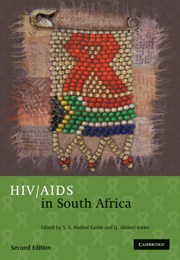Book contents
- Frontmatter
- Contents
- List of Contributors
- Foreword: Peter Piot
- Foreword: Nelson R Mandela
- Acknowledgements
- Section 1 Birth of a rapidly growing epidemic
- Section 2 The virus, the human host and their interactions
- Section 3 HIV risk factors and prevention strategiess
- Section 4 Focal groups for understanding the HIV epidemic
- Section 5 The impact of AIDS
- 21 Impact of AIDS – the health care burden
- 22 The impact of AIDS on the community
- 23 The impact on ethics
- 24 The economic impact of AIDS
- 25 AIDS-related mortality in South Africa
- 26 Picking up the pieces: the end of AIDS denialism and its aftermath
- Section 6 Treating HIV
- Section 7 What does the future hold?
- Index
24 - The economic impact of AIDS
Published online by Cambridge University Press: 07 September 2011
- Frontmatter
- Contents
- List of Contributors
- Foreword: Peter Piot
- Foreword: Nelson R Mandela
- Acknowledgements
- Section 1 Birth of a rapidly growing epidemic
- Section 2 The virus, the human host and their interactions
- Section 3 HIV risk factors and prevention strategiess
- Section 4 Focal groups for understanding the HIV epidemic
- Section 5 The impact of AIDS
- 21 Impact of AIDS – the health care burden
- 22 The impact of AIDS on the community
- 23 The impact on ethics
- 24 The economic impact of AIDS
- 25 AIDS-related mortality in South Africa
- 26 Picking up the pieces: the end of AIDS denialism and its aftermath
- Section 6 Treating HIV
- Section 7 What does the future hold?
- Index
Summary
IT CAN BE ARGUED that AIDS will affect economies; growth will slow and the structures will change. Economics is also a driver of the epidemic in that economic hardship can change people's behaviour to make them more susceptible to infection. What is increasingly apparent is how hard it is to distinguish the effect of AIDS from other factors: inflation; food security and climate change.
South Africa is a middle income country but one in which the distribution of wealth is still very uneven. Per capita growth in South Africa was low in the first decade following the 1994 liberation, but from 2003 to 2007 it was consistently above 4% annum. It is likely that the next few years will see a marked slow down due to global fundamentals and internal problems with power supply. There have been changes in the structure of the economy. The primary (agriculture, forestry and mining) and secondary (manufacturing, electricity, gas, water and construction) sectors are shrinking as contributors to gross domestic product (gdp), while the tertiary sector (all services – banking, insurance, trade and tourism) is growing. The result has been rising unemployment.
The macroeconomic impact of aids is determined by the demographics of those most affected, the young and economically active, and in the costs of combating the disease. Economic growth will be less than it would be without aids, although the exact reduction is hard to determine.
- Type
- Chapter
- Information
- HIV/AIDS in South Africa , pp. 417 - 431Publisher: Cambridge University PressPrint publication year: 2010



